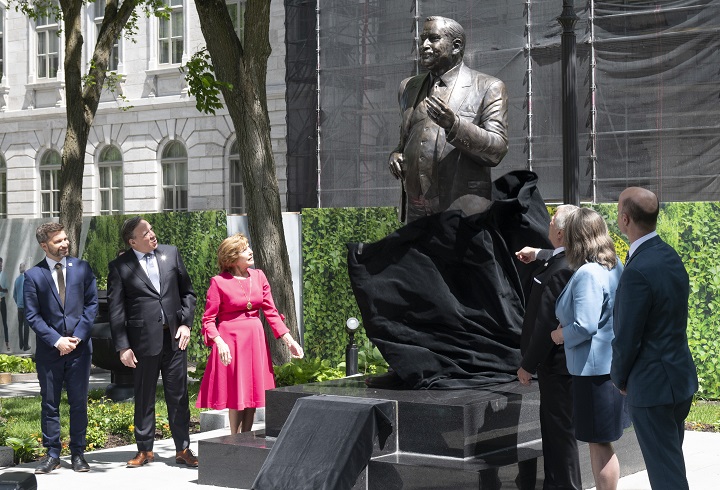As a statue of former Parti Québécois premier Jacques Parizeau was unveiled Wednesday in Quebec City, his successor in the province’s top job declared that separation remains the solution for the province.

Lucien Bouchard spoke after the statue of Parizeau, wearing a trademark three-piece suit with his hand in the vest pocket, was revealed outside the national assembly in the presence of his widow, Lisette Lapointe, Premier François Legault and other dignitaries.
Quebec sovereignty remains a “necessity,” Bouchard told reporters. “It is still relevant because it is in the hearts of a large number of Quebecers, (but) not a majority. In mine too. I am convinced that this is the solution.”
Lapointe, also a former PQ member of the legislature, told the crowd that her late husband always urged people not to be afraid of their dreams. “His was immense, the greatest of dreams, to make Quebec a country,” she said, “and he very nearly realized it. Until the end of his life, he never gave up on his dream.”
Parizeau was premier from September 1994 until he resigned after suffering a narrow defeat in the Oct. 30, 1995, sovereignty referendum. He was replaced by Bouchard, who stepped down in 2001.

Get daily National news
A senior civil servant in the 1960s, Parizeau helped establish the Caisse de depot et placement du Quebec, the province’s pension fund manager, before entering politics and serving as finance minister in the government of Rene Levesque from 1976 to 1984.
- Poilievre calls Trump’s Canada attacks ‘wrong,’ urges U.S. trade stability
- Alberta budget 2026 comes with spending hikes but $9.4B deficit
- Liberals survive confidence vote as House passes budget implementation bill
- Liberal, Bloc Québécois rematch in Terrebonne riding after Supreme Court nixes result
He left the party when the PQ took a chance on supporting federalism but made a comeback as PQ leader in 1988, winning the 1994 election with the aim of achieving sovereignty.
He announced his resignation the day after the 1995 referendum defeat, which he had blamed on money and ethnic votes in a referendum-night speech.
Parizeau remained a spiritual leader of the sovereigntist movement and a spoilsport for the Parti Québécois with his occasional interventions before his death on June 1, 2015.
For Bouchard, the need for a sovereign Quebec is clear when considering the endless debates with Ottawa.
“Everything becomes a problem in the management of the Quebec state because of its extremely difficult, probably impossible, relations with the federal government as it is designed,” he said.
But Bouchard acknowledged his former party is in a difficult position ahead of the October provincial election.
“It’s clear that things are not going well at the PQ, we agree with that, but things are not going well in other parties too,” he said, adding that political parties are “vehicles” in politics, “which can be replaced, which last as long as it is useful.”
The imposing bronze statue by Montreal sculptors Jules Lasalle and Annick Bourgeau faces Jacques-Parizeau Street in Quebec City and was created through a $120,000 fundraising campaign.







Comments
Want to discuss? Please read our Commenting Policy first.